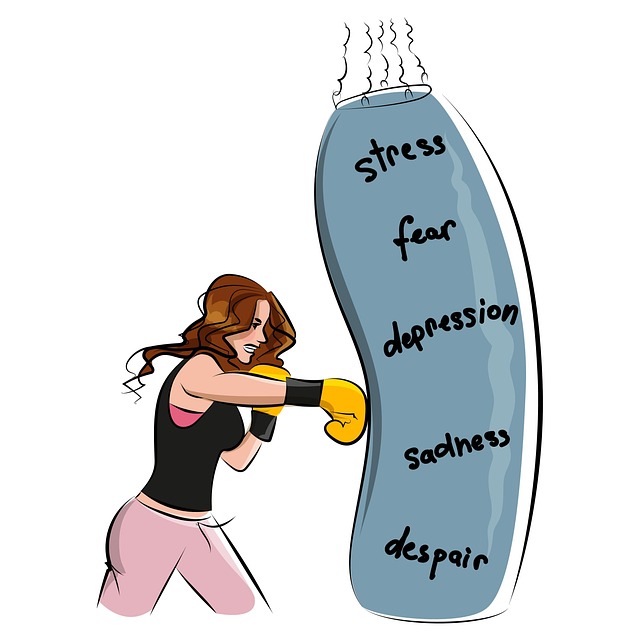Westminster Somatic Experiencing (WSE) Therapy emphasizes resilience building through the RFM model—Resources, Strengths, and Motivation—to enhance mental well-being. This approach leverages body-mind connections, focusing on present-moment experiences to release repressed sensations from past traumas, fostering calm and stability. WSE exercises promote self-awareness and nervous system regulation, encouraging safe expression of traumatic events without judgment. Integrating RFM practices into group settings or podcasts involves educating, setting intents, choosing tailored exercises, creating safe spaces, demonstrating effectiveness, and tracking progress to refine techniques. Measuring success involves assessing psychological and physiological changes through regular evaluations, showcasing improved emotional regulation and stress reduction in daily life.
In today’s fast-paced world, building resilience is crucial for navigating life’s challenges. This article explores a powerful approach called RFM (Resourceful Engagement with Stress), grounded in Westminster Somatic Experiencing Therapy. We’ll delve into the foundational concepts of RFM and its role in enhancing resilience. Learn about key principles, practical exercises, and step-by-step implementation strategies. Discover how to measure success and evaluate the impact of this transformative training.
- Understanding RFM: A Foundation for Resilience
- The Role of Somatic Experiencing Therapy in Building Resilience
- Key Principles and Practices of Westminster Somatic Experiencing
- Implementing RFM Exercises: A Step-by-Step Guide
- Measuring Success: Evaluating the Impact of Resilience Training
Understanding RFM: A Foundation for Resilience

Resilience is a key component of mental well-being and coping with life’s challenges. Understanding RFM (Resources, Strengths, and Motivation) forms a solid foundation for building this resilience. The RFM model, often utilized in Westminster Somatic Experiencing Therapy, helps individuals identify their inherent resources and strengths that can be leveraged to navigate through difficult situations. By recognizing what they have available – physical, emotional, social, or intellectual – individuals gain a sense of security and empowerment.
This awareness is crucial for effective conflict resolution techniques and compassion cultivation practices. When people feel more connected to their internal strengths and external resources, they are better equipped to handle crises and provide crisis intervention guidance to themselves and others. Moreover, the RFM framework encourages individuals to cultivate motivation by setting achievable goals that help them maintain focus and perseverance during challenging times.
The Role of Somatic Experiencing Therapy in Building Resilience

Somatic Experiencing Therapy (SET) plays a pivotal role in building resilience by addressing the deep connection between our bodies and emotions. This therapeutic approach, developed by Dr. Peter Levine, recognizes that trauma often leaves residual physical tension and sensory memories, which can affect an individual’s emotional intelligence and mood management skills. By focusing on safe, present-moment experiences, SET helps clients process and release these repressed sensations, fostering a greater sense of calm and stability.
Westminster Somatic Experiencing Therapy goes beyond traditional talk therapy by engaging the body’s natural healing mechanisms. This method is particularly effective in trauma support services, as it enables individuals to reconnect with their innate capacity for resilience. By learning to regulate physical responses during stressful situations, clients gain valuable tools for mood management and emotional regulation, enhancing their overall ability to navigate life’s challenges with greater ease and grace.
Key Principles and Practices of Westminster Somatic Experiencing

Westminster Somatic Experiencing (WSE) Therapy is a unique approach to healing and resilience building that emphasizes the connection between our physical, emotional, and mental states. At its core, WSE focuses on helping individuals develop self-awareness through specific exercises designed to access and release stored trauma or stress responses. This therapy promotes the idea that by becoming more attuned to our bodies’ signals, we can regulate our nervous systems and gain greater control over our reactions to stressful situations.
The key principles of WSE involve facilitating safe, supportive communication strategies within individuals, allowing them to re-experience and process past events. These self-awareness exercises are often guided by experienced practitioners who encourage clients to explore their bodily sensations, memories, and emotions without judgment. By integrating this practice into a holistic mental wellness routine, including regular self-care activities and sometimes even a Mental Wellness Podcast Series Production, individuals can build resilience and enhance their overall well-being.
Implementing RFM Exercises: A Step-by-Step Guide

Implementing RFM (Resilience, Flexibility, and Mindfulness) exercises is a powerful way to enhance mental wellness, as evidenced by Westminster Somatic Experiencing Therapy. Here’s a step-by-step guide to get you started:
1. Educate Yourself: Begin by familiarizing yourself with the principles of RFM. Understand the science behind resilience building and emotional regulation. This knowledge will equip you to effectively communicate and teach these practices, especially when facilitating groups or hosting a Mental Wellness Podcast Series Production.
2. Set Clear Intents: Define your goals for implementing RFM exercises. Are you aiming to reduce stress? Improve emotional intelligence? Enhance overall mental wellness? Setting clear intents will guide your choice of exercises and help participants connect with the benefits on a deeper level.
3. Choose Appropriate Exercises: Select RFM practices that cater to your audience’s needs. Compassion cultivation practices, for instance, can foster empathy and self-kindness. Incorporating mindfulness techniques can help in managing stress and cultivating present-moment awareness. Each exercise should align with the emotional regulation aspect of RFM.
4. Create a Safe Space: Ensure your environment is conducive to open expression and vulnerability. Encourage participants to share their experiences without judgment. This safety net allows for deeper engagement and encourages the practice of emotional regulation in a supportive setting.
5. Demonstrate and Guide: Lead by example. Demonstrate the exercises yourself before asking participants to engage. Provide clear instructions and offer guidance as needed. Ensure everyone understands the activity and its purpose, especially when introducing new compassion cultivation practices.
6. Encourage Practice: Regularity is key to building resilience. Encourage participants to practice RFM exercises daily or as often as possible. Incorporate these practices into routines to promote consistent emotional regulation and mental wellness.
7. Track Progress: Monitor individuals’ progress and provide constructive feedback. This step is crucial for refining the exercises and tailoring them to specific needs within your Mental Wellness Podcast Series Production.
Measuring Success: Evaluating the Impact of Resilience Training

Measuring success is a vital aspect of any training program, especially when it comes to resilience building. In the context of Westminster Somatic Experiencing Therapy (WSE), evaluating the impact of resilience training involves assessing both psychological and physiological changes in individuals over time. This process includes tracking improvements in emotional regulation skills, as well as reductions in stress-related symptoms and physical tension.
Through regular assessments, participants can observe firsthand their enhanced ability to cope with challenging situations. The integration of social skills training within WSE further reinforces these gains by promoting healthy interactions and fostering a sense of community. By combining quantitative metrics with qualitative feedback, the effectiveness of resilience training can be accurately gauged, ensuring that individuals not only feel more resilient but also exhibit improved emotional regulation and stress reduction methods in their daily lives.
Westminster Somatic Experiencing Therapy offers a powerful approach to building resilience through RFM exercises, providing individuals with the tools to navigate life’s challenges. By integrating understanding, somatic experiences, and key principles, these exercises empower folks to enhance their mental and emotional fortitude. Following the step-by-step guide and measuring success through evaluation, anyone can embark on a journey towards greater resilience. This holistic process ensures that individuals not only survive but thrive in today’s demanding world.














